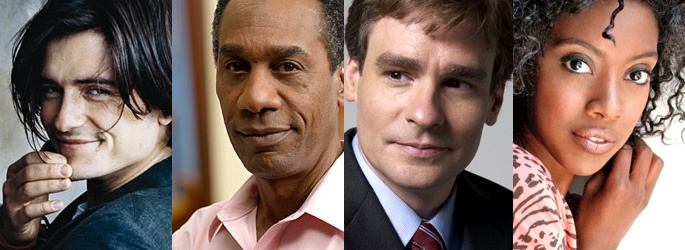It was the week of the Oscars here in Tinseltown, and Disney Hall could not escape the glitz and glamour of Hollywood. In presenting Peter Ilyich Tchaikovsky’s Shakespearean Fantasy Overtures on Feb. 26 as part of its TchaikovskyFest, the LA Philharmonic collaborated with a star-studded cast that included Orlando Bloom, Robert Sean Leonard, Joe Morton and Condola Rashad, who performed scenes from Shakespeare’s plays before the start of each music selection.
Youth and glamour go hand in hand with stardom. So appearing on stage were Gustavo Dudamel and the 200 young, passionate and rowdy bunch of musicians of the Simón Bolívar Symphony Orchestra of Venezuela.
Even the audience seemed to have been under Hollywood’s spell, as the ladies — undeterred by the rainy weather — appeared adorned in ritzy gowns and the accompanying gentlemen in well-tailored suits. The valet line at Disney Hall had the look of a trendy nightclub on the Sunset Strip, with Bentleys and Ferraris lining up along Grand Avenue.
All of the glittery glamour surrounding the evening, however, was out-shined by Shakespeare and Tchaikovsky as soon as the stage lights dramatically shone on Robert Sean Leonard. Leonard stood by the pipe organ, with its diagonally opposed pipes sprouting out like the rays of the sun, so that Hamlet’s words, “To be or not to be, that is the question,” had an especially dramatic effect, boldly reverberating throughout the hall.
As Leonard concluded Hamlet’s soliloquy, Dudamel left no opportunity for the dramatic tension in the hall to subside. The orchestra entered with the rapid crescendoed roll of the timpani. The push and pull between the upper and lower strings in Tchaikovsky’s music perhaps reflects the emotional turmoil of Hamlet. But under Dudamel and the SBSOV, the music had the look and feel of tango dancers taking a step forward and back, with the orchestra passionately swaying back and forth with the flow of the music.
“The Tempest” opened with Joe Morton from the rear corner of the stage reciting Prospero’s soliloquy, “Ye helves of hills.” Fittingly, the oval orchestra stage gave the impression of Prospero on a small island. The music opened with the strings playing a textured arpeggio that felt like the rocking of a gentle sea. But the dark horns boldly announced the brooding storm.
Orlando Bloom opened “Romeo & Juliet,” calling on Juliet while standing on the ledge in the middle of the hall amongst the audience. Lighting effects cast shadows of branches on the floor of the hall to help the audience picture Romeo hiding amidst the trees in Juliet’s backyard. Juliet appeared as a seductive shadow on the West Wing of the hall, unaware of Romeo’s presence below. When Juliet finally called “O Romeo, Romeo! Wherefore art thou Romeo?,” Bloom excitedly ran from one corner of the hall to another, reflecting his character’s youthful and exuberant love.
If Debussy is the master of capturing the impressions of nature, then Tchaikovsky is the master impressionist of the heart. When the heart beat slowly, as in the retrospective introduction of “Romeo & Juliet,” the music under Dudamel and the SBSOV lacked the atmospheric and dramatic landscape that Esa-Pekka Salonen masterfully painted when conducting the LA Phil. When the heart fluttered excitedly, the SBSOV was brashly charming in its display of power. In the sword fight scene, when Dudamel called on the violins, the musicians responded with the immediacy and overwhelming force of a swarm of bees.
Perhaps befitting the innocent, unadulterated love between the young lovers Romeo and Juliet, the young Dudamel and SBSOV musicians carried the romance theme to its climactic peak with such searing passion as to melt away all tension and conflict in prior sections of the music.
If the rousing reception from the audience in the nearly full house was any indication, it was that Dudamel and the SBSOV have the incredible, spellbinding ability to communicate the power, passion and beauty of classical music. Is there an award category for that?
—Samuel Jang, Culture Spot LA
For information about upcoming concerts, visit www.laphil.com.






